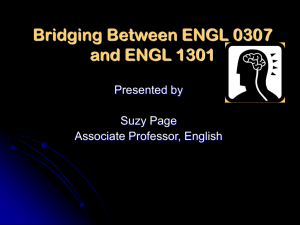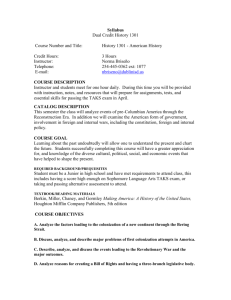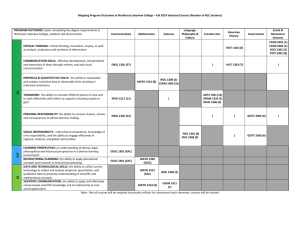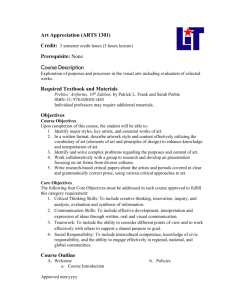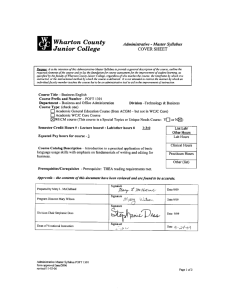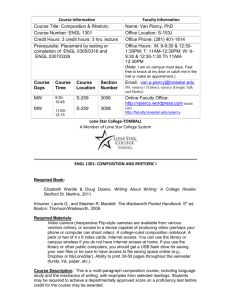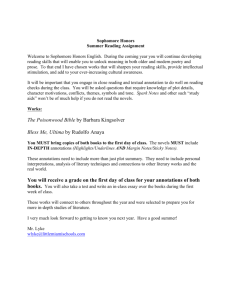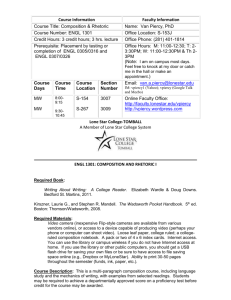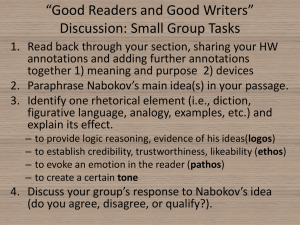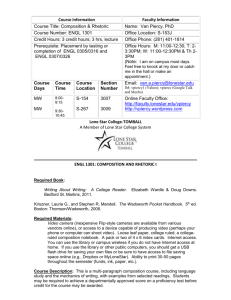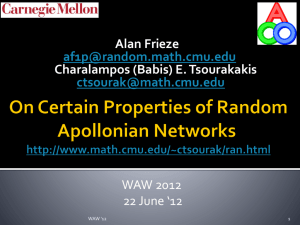English 1301 - Brief Syllabus - Fall 2013 Lone Star College
advertisement
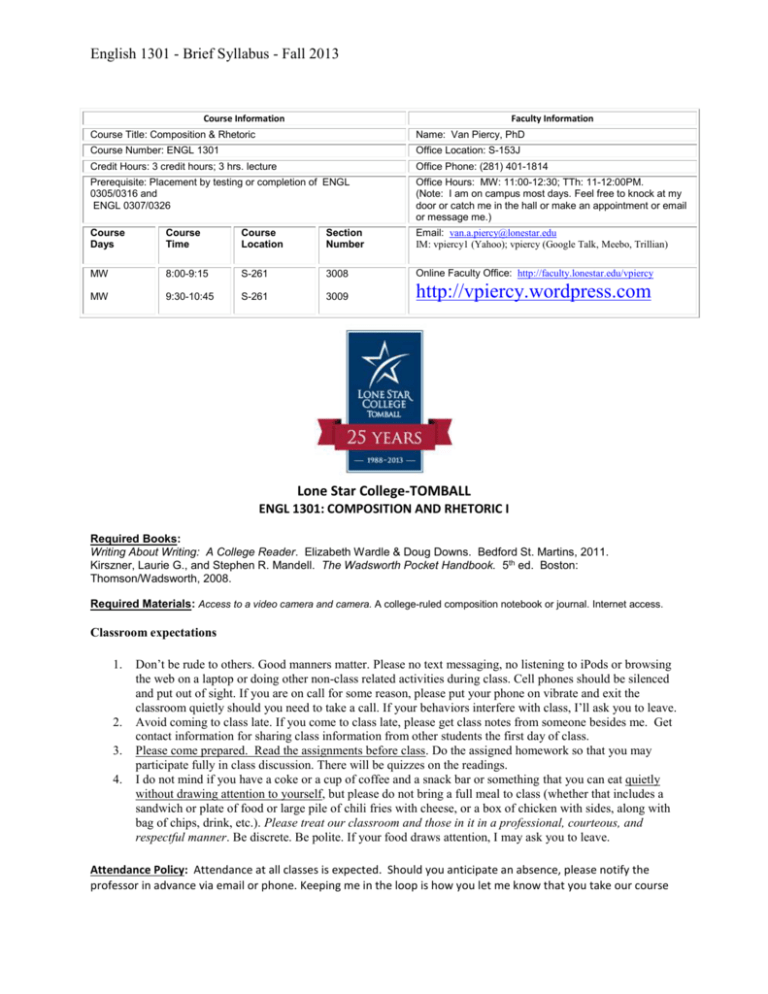
English 1301 - Brief Syllabus - Fall 2013 Course Information Faculty Information Course Title: Composition & Rhetoric Name: Van Piercy, PhD Course Number: ENGL 1301 Office Location: S-153J Credit Hours: 3 credit hours; 3 hrs. lecture Office Phone: (281) 401-1814 Prerequisite: Placement by testing or completion of ENGL 0305/0316 and ENGL 0307/0326 Office Hours: MW: 11:00-12:30; TTh: 11-12:00PM. (Note: I am on campus most days. Feel free to knock at my door or catch me in the hall or make an appointment or email or message me.) Course Days Course Time Course Location Section Number Email: van.a.piercy@lonestar.edu IM: vpiercy1 (Yahoo); vpiercy (Google Talk, Meebo, Trillian) MW 8:00-9:15 S-261 3008 Online Faculty Office: http://faculty.lonestar.edu/vpiercy MW 9:30-10:45 S-261 3009 http://vpiercy.wordpress.com Lone Star College-TOMBALL ENGL 1301: COMPOSITION AND RHETORIC I Required Books: Writing About Writing: A College Reader. Elizabeth Wardle & Doug Downs. Bedford St. Martins, 2011. Kirszner, Laurie G., and Stephen R. Mandell. The Wadsworth Pocket Handbook. 5th ed. Boston: Thomson/Wadsworth, 2008. Required Materials: Access to a video camera and camera. A college-ruled composition notebook or journal. Internet access. Classroom expectations 1. 2. 3. 4. Don’t be rude to others. Good manners matter. Please no text messaging, no listening to iPods or browsing the web on a laptop or doing other non-class related activities during class. Cell phones should be silenced and put out of sight. If you are on call for some reason, please put your phone on vibrate and exit the classroom quietly should you need to take a call. If your behaviors interfere with class, I’ll ask you to leave. Avoid coming to class late. If you come to class late, please get class notes from someone besides me. Get contact information for sharing class information from other students the first day of class. Please come prepared. Read the assignments before class. Do the assigned homework so that you may participate fully in class discussion. There will be quizzes on the readings. I do not mind if you have a coke or a cup of coffee and a snack bar or something that you can eat quietly without drawing attention to yourself, but please do not bring a full meal to class (whether that includes a sandwich or plate of food or large pile of chili fries with cheese, or a box of chicken with sides, along with bag of chips, drink, etc.). Please treat our classroom and those in it in a professional, courteous, and respectful manner. Be discrete. Be polite. If your food draws attention, I may ask you to leave. Attendance Policy: Attendance at all classes is expected. Should you anticipate an absence, please notify the professor in advance via email or phone. Keeping me in the loop is how you let me know that you take our course English 1301 - Brief Syllabus - Fall 2013 seriously and are making efforts to stay engaged. An excessive number of absences will prohibit the successful completion of this course and will result in an “F” in the course. In case of absence, it is the student’s responsibility to obtain lecture notes and assignments from a classmate. Anyone who has missed more than three class periods and is maintaining less than a "D" in the course may be dropped from the course or may receive a final grade of “F” if the final drop day has passed. NOTE: I cannot guarantee that you will be dropped for excessive absences. If I do not drop you, you will receive an “F” for excessive absences. It is your responsibility to drop the course if you decide not to finish the course and don’t want an “F.” Maximum number of absences allowed: TTh or MW: 3 class periods. MWF: 4 class periods First Three Weeks Tentative Daily Schedule for English 1301 The full version of this syllabus is available at http://vpiercy.wordpress.com. NOTE: All reading and writing assignments are to be completed before class on the date on which they appear on the schedule. It is a good idea to mark the due dates of major assignments from all your classes so that you can see what weeks will be especially busy. Also, bring your textbook to class whether or not reading is assigned for a particular day. Unless otherwise indicated, all readings are from Wardle and Downs, Writing About Writing (WAW). Always bring your composition journal and textbook to class. WEEK 1 Introduction and Unit I: What is Academic Writing? Aug 26 Introduction to the course; examine syllabus and course schedule. Introduction to summary writing. Go over criteria of a good summary. Cf. paraphrase. Discuss plagiarism and academic writing expectations. Annotations. Preview WAW pp. 1-5. Assign text for diagnostic summary: David Bartholomae, “Inventing the University” (available online at http://firstyearwriting.wikispaces.com/file/view/Inventing+the+University.pdf; you can also find this link on the course website at http://vpiercy.wordpress.com. Aug 28 In-class diagnostic essay (1st draft of Summary 1); David Bartholomae, “Inventing the University.” Bring a "Blue Book" to class (available from the bookstore) for writing your summary. WEEK 2 Sep 2 No class Labor Day. Sep 4 Go over in-class diagnostic essay; discuss Bartholomae essay and “Introduction: What Is Academic Writing?” WAW pp. 1-5. Discuss annotation assignments and journals. WEEK 3 Sep 10 Read "'Create a Research Space' (CARS) Model of Research Introductions," WAW pp. 6-8. Read Greene, "Argument as Conversation" WAW pp. 9-21. Journal: Write on one of the "Questions..." on p. 20. Students need to bring their annotations of the Greene reading to class (do the annotations in your journal). Discuss in groups; share best annotations on overhead. Introduce rhetorical analysis. Review four elements for rhetorical analysis. Sep 12 Read Kleine, “What Is It We Do When We Write Articles Like This One...?” (pp. 22-33). Journal: Write on one of the "Questions..." on pp. 32-33. Write a rhetorical analysis on one paragraph of the Kleine for your journal. Bring your annotations (in your journal) of Kleine to class.
